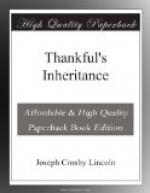The happenings of the next few minutes were noisy and profane. E. Holliday Kendrick was responsible for most of the noise and all of the profanity. He stormed up and down the office, calling his cousin every uncomplimentary name that occurred to him, vowing the whole story to be a lie, and that the land should be his anyway; threatening suit and personal vengeance. His last words, as he strode to the door, were:
“And—and you’re the fellow, the poor relation, that I gave my business to just from kindness! All right! I haven’t finished with you yet.”
John’s answer was calm, but emphatic.
“Very well,” he said. “But this you must understand: I consider myself under no obligation whatever to you, Mr. Kendrick. In the very beginning of our business relationship you and I had a plain talk. I told you when I consented to act as your attorney that I did so purely as a matter of business and that philanthropy and kinship were to have no part in it. And when you first mentioned your intention of forcing Mrs. Barnes to give up her home I told you what I thought of that, too.”
East Wellmouth’s wealthiest summer resident expressed an opinion.
“You’re a fool!” he snarled. “A d—d impractical fool!”
The door slammed behind him. John laughed quietly.
“As a judge of character, Captain Bangs,” he observed, “my respected cousin should rank high.”
Captain Obed’s first act after E. Holliday’s departure was to rush over, seize the young man’s hand with one of his own, and thump him enthusiastically upon the back with the other.
“I said it!” he crowed. “I knew it! I knew you was all right and square as a brick all the time, John Kendrick! Now let me meet some of those folks that have been talkin’ against you! You never did a better day’s work in your life. He’s down on you, but every decent man in Ostable County’ll be for you through thick and thin after this. Hooray for our side! John, shake hands with me again.”
They shook, heartily. The captain was so excited and jubilant that he was incoherent. At last, however, he managed to recover sufficiently to ask a question.
“But how did you do it,” he demanded. “How did you get on the track of it? You must have had some suspicions.”
John smiled. His friend’s joy evidently pleased him, but he, himself, was rather sober and not in the least triumphant.
“I did have a suspicion, Captain,” he said. “In fact, I had been told that I had a claim to a piece of land somewhere along the shore here in East Wellmouth. My father told me years ago, when he was in his last sickness. He said that he owned a strip of land here, but that it was probably worth little or nothing. When I came here I intended looking into the matter, but I did not do so. Where the original deed may be, I don’t know even now. It may be among some of my father’s papers, which are stored in New York. But the record of the transfers I found in Ostable; and that is sufficient. My claim may not be quite as impregnable as I gave my late client to understand, but it will be hard to upset. I am the only possible claimant and I have transferred my claim to Mrs. Barnes. The land belongs to her now; she can’t be dispossessed.”




